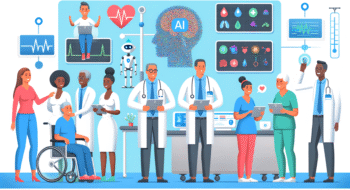Revolutionizing Technology: The Impact of Artificial Intelligence on Society
Artificial Intelligence (AI) is revolutionizing technology, reshaping industries, and impacting daily life. As a cornerstone of technological advancement, AI sparks excitement and prompts important discussions about its implications for society. In this article, we explore AI’s influence, delving into its benefits, challenges, and necessary ethical considerations as we embrace this transformative technology.
The Rise of Artificial Intelligence
AI, a branch of Machine Learning and Data Science, has significantly evolved over the decades. It involves systems and algorithms that simulate human intelligence, enabling machines to analyze data, recognize patterns, make decisions, and learn from experience. The proliferation of AI research and application is driven by Big Data, increased computational power, and advanced algorithms, leading to its widespread integration across sectors.
Key Areas of AI Application
- Healthcare: AI enhances diagnostics, personalizes treatment plans, and predicts disease outbreaks. More on this at Healthcare IT News.
- Finance: AI algorithms play crucial roles in fraud detection, risk assessment, and automated trading. Further insights at Forbes.
- Transportation: Self-driving cars and AI-driven traffic management are set to transform transportation. Details at TechRepublic.
- Education: AI provides personalized learning experiences and enhances administrative efficiency. Learn more at EdTech Magazine.
Benefits of AI Integration
The integration of AI into various sectors yields multiple benefits, including:
- Increased Efficiency: AI performs tasks with greater speed and precision, resulting in reduced operational costs.
- Enhanced Decision-Making: AI analyzes vast datasets, offering valuable insights for informed decision-making.
- Innovation: By enabling new business models and products, AI fosters innovation and economic growth.
Challenges of AI
While AI offers numerous benefits, it also presents challenges:
- Job Displacement: Automation threatens jobs in certain sectors. Planning for workforce transitions is critical.
- Data Privacy: Heavy data reliance raises concerns about personal information handling. Read more at Privacy International.
- Bias and Discrimination: AI can perpetuate existing biases, resulting in unfair treatment. Addressing this is crucial for ethical AI development.
Ethical Considerations in AI
As AI becomes ubiquitous, addressing ethical concerns is paramount. Focus areas include:
- Transparency: Organizations must clearly disclose AI systems’ development and operation to build trust. For more, see Forbes.
- Accountability: Identifying responsibility during AI failures is crucial for public confidence.
The Future of AI Technology
The future of AI, including Neural Networks, Robotics, and Natural Language Processing (NLP), holds boundless possibilities and challenges. Expect greater AI capabilities leading to:
- Greater Human-AI Collaboration: AI will enhance human work, fostering new partnerships across industries.
- Improved Global Solutions: AI could offer innovative solutions to global challenges like climate change and poverty alleviation.
Conclusion
Artificial Intelligence is transforming technology and shaping society. As we navigate this evolving landscape, addressing challenges and ethical concerns is essential. With responsible development and implementation, AI can herald a brighter, more efficient, and equitable future.
Stay informed on AI and technology trends by following resources like The Verge and MIT Technology Review.
Discover related articles on our website about AI Applications and Machine Learning Benefits.
Embrace AI technology responsibly! Visit our AI Subdomain for the latest updates.







